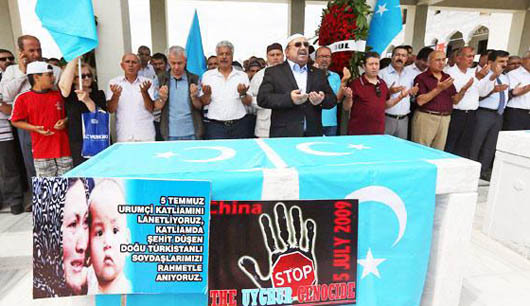
Riyadh, Jul 5: Saudis and expatriates have slammed the Chinese government’s ban on Muslims in the Xinjiang region from fasting in Ramadan and praying at mosques, as a violation of human rights.
They urged Saudi Arabia and other Muslim countries to take political and economic action against China for its oppressive policy. They also called for a boycott of Chinese products.
The 57-member Organization of Islamic Cooperation (OIC), meanwhile, said it has contacted the Chinese government to discuss the issue.
“We are waiting for a reply from China,” an informed source said.
According to press reports, the Chinese authorities across the country’s northwest region of Xinjiang have banned Muslim students and civil servants from taking part in all “religious activities” during Ramadan.
In a region where around 45 percent of the population is Muslim, a series of notices issued by schools and government departments have “strictly forbidden” anyone from taking part in fasting, and some have even been banned from performing their daily prayers at mosques.
Mohammed Badahdah, assistant secretary-general of the World Assembly of Muslim Youth, said the Chinese government has been imposing anti-Islam policies for the past several years.
“China is a closed country and we have started knowing about its oppressive policies against Muslims through social media.”
He said the UN and the Security Council have failed to protect Muslims.
“We Muslims have to unite and return to the teachings of the Qur’an and Sunnah. That is the only solution for our problems,” he said.
He said tyrants and tyrannical regimes in the world would disappear one day. “They have to learn lessons from history.”
Badahdah said the Chinese action was a violation of the Universal Declaration of Human Rights that protects freedom of religion and opinion.
“It’s the highest degree of injustice. People should be allowed to practice their religion,” he said and rejected the Chinese claim that fasting in Ramadan would make Xinjiang Muslims radicals.
“This shows their anti-Islam attitude as they consider those who practice Islam as terrorists. If this is allowed to continue, they will ban Muslims from Haj and Umrah. So Muslims all over the world should unite against such unjust and inhuman practices to put an end to them. We are a big force with a population of 1.5 billion and should defeat the enemy’s machinations to divide us. We have to become real Muslims to receive the help of Allah.”
Fuad Tawfik, a Saudi engineer, urged Saudi Arabia and other OIC countries to support Muslim minorities in China and elsewhere.
“Our government took strong action against the Netherlands when a rightwing politician in the country abused Islam and the Saudi flag. We should take similar action against China if they do not review their anti-Muslim stance,” he said.
He decried the worsening condition of Muslims all over the world.
“They are even tested by some Muslim governments. This is very unfortunate. At the same time, it gives us the glad tidings that the support of the Almighty is very near for Muslims to overcome this period of troubles and tribulations. But we should exercise patience,” he said.
Blogger Hashmet Hussain said Muslim countries should stop importing Chinese products.
“Banning the basic right of following the religion of Islam is a kind of terrorism,” he said.
Another blogger said: “For their own benefit China should immediately withdraw their decision and apologize to Muslims.”





Comments
Add new comment